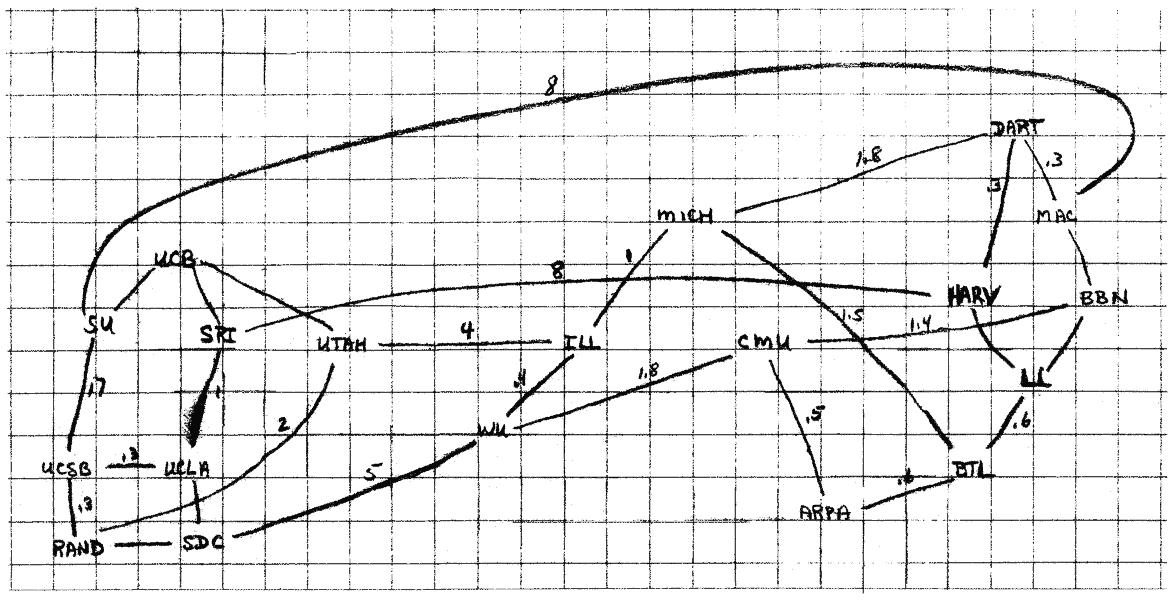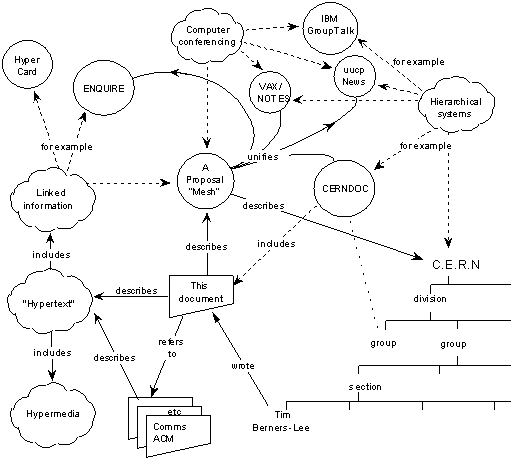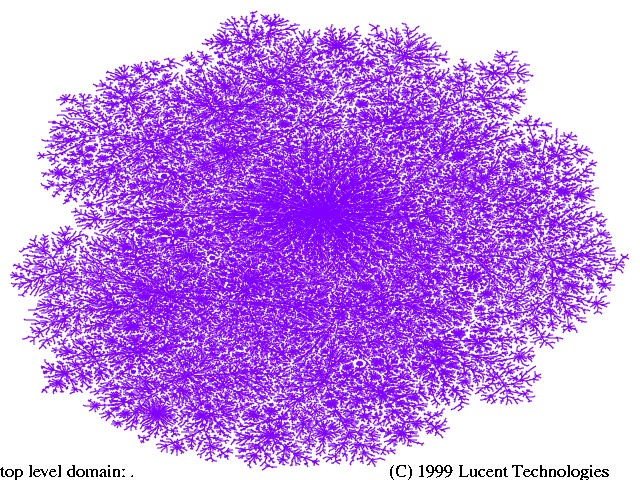
Moderators: Elvis, DrVolin, Jeff
beeline wrote:I don't understand why newspapers don't charge more often for online content. I would gladly pay for an online subscription for my paper. Like most papers, the are hemmorhaging money.














JackRiddler wrote:This Internet pioneer is interviewed in the German documentary about the Unabomber and the transhumanists, Das Netz. (There's a post about that here somewhere.)
[...]
On that page you will also see one of the first RAND proposals from the 1960s, for a communications network that would survive a nuclear attack (the original idea behind ARPANET and the Internet).
Misconceptions of design goals
Common ARPANET lore posits that the computer network was designed to survive a nuclear attack. In A Brief History of the Internet, the Internet Society describes the coalescing of the technical ideas that produced the ARPANET:
It was from the RAND study that the false rumor started, claiming that the ARPANET was somehow related to building a network resistant to nuclear war. This was never true of the ARPANET, only the unrelated RAND study on secure voice considered nuclear war. However, the later work on Internetting did emphasize robustness and survivability, including the capability to withstand losses of large portions of the underlying networks.[5]
Although the ARPANET was designed to survive subordinate-network losses, the principal reason was that the switching nodes and network links were unreliable, even without any nuclear attacks. About the resource scarcity that spurred the creation of the ARPANET, Charles Herzfeld, ARPA Director (1965–1967), said:
The ARPANET was not started to create a Command and Control System that would survive a nuclear attack, as many now claim. To build such a system was, clearly, a major military need, but it was not ARPA’s mission to do this; in fact, we would have been severely criticized had we tried. Rather, the ARPANET came out of our frustration that there were only a limited number of large, powerful research computers in the country, and that many research investigators, who should have access to them, were geographically separated from them.[6]
Packet switching pioneer Paul Baran affirms this, explaining: "Bob Taylor had a couple of computer terminals speaking to different machines, and his idea was to have some way of having a terminal speak to any of them and have a network. That's really the origin of the ARPANET. The method used to connect things together was an open issue for a time."
tazmic wrote:Misconceptions of design goals
Common ARPANET lore posits that the computer network was designed to survive a nuclear attack. In A Brief History of the Internet, the Internet Society describes the coalescing of the technical ideas that produced the ARPANET:
It was from the RAND study that the false rumor started, claiming that the ARPANET was somehow related to building a network resistant to nuclear war. This was never true of the ARPANET, only the unrelated RAND study on secure voice considered nuclear war. However, the later work on Internetting did emphasize robustness and survivability, including the capability to withstand losses of large portions of the underlying networks.[5]
Although the ARPANET was designed to survive subordinate-network losses, the principal reason was that the switching nodes and network links were unreliable, even without any nuclear attacks. About the resource scarcity that spurred the creation of the ARPANET, Charles Herzfeld, ARPA Director (1965–1967), said:
The ARPANET was not started to create a Command and Control System that would survive a nuclear attack, as many now claim. To build such a system was, clearly, a major military need, but it was not ARPA’s mission to do this; in fact, we would have been severely criticized had we tried. Rather, the ARPANET came out of our frustration that there were only a limited number of large, powerful research computers in the country, and that many research investigators, who should have access to them, were geographically separated from them.[6]
Packet switching pioneer Paul Baran affirms this, explaining: "Bob Taylor had a couple of computer terminals speaking to different machines, and his idea was to have some way of having a terminal speak to any of them and have a network. That's really the origin of the ARPANET. The method used to connect things together was an open issue for a time."
Two weeks after the 1994 election, Vice President Al Gore sent a memo to all government department ordering them to justify every program under the jurisdiction or risk either termination or privatization of those services. Within a month, he had negotiated deep cuts, totaling nearly $20 billion, in the Departments of Energy, Transportation, and Housing. When Gingrich introduced a bill making privatization mandatory in most agencies, Clinton and Gore denounced it as a rigid piece of legislation that would limt competition and government flexibility.
After two years of negotiations, the administration and the Republican congressional leadership agreed on a bill that required agencies to annually publish a list of jobs that are not "inherently governmental" and put them up for bid. The compromise elated conservatives, who had been waiting for such legislation for decades. When Clinton spelled out details in his 1996 budget, the Heritage Foundation hailed it as "the boldest privatization agenda put forth by any American president to date," and the Reason Foundation called it "the highlight of the year for privatization."
It was an amazing feat: even as Gingrich and his Republican colleagues were hammering Clinton on having an affair with a White House intern and over his foreign policy in Haiti and North Korea, they were working closely with him on privatization...
...
Overall, the number of government agencies that were privatized during the Clinton administration is astounding. [b]One of the first government services to be sold to private interests was the vast computer network known as the Internet, which had started initially as a defense project linking government research institutes in different states. In 1993, the Clinton admin turned over the registration of domain names to a private company called Network Solutions (perhaps this was what Gore meant in 200 when claimed to be the "inventor" of the Internet.) A few years later, when the company's government sanctioned monopoly became controversial, management of the Web was handed over to an international consortium called the Internet Corporation for Assigned Names, or ICANN.

LAWNMOWER MAN 2: JOBE'S WAR 1996 (93 MINS)
Jobe, the computer-enhanced genius of Lawnmower Man, is resuscitated by Jonathan Walker (Patrick Bergin), a conniving businessman. Walker wants Jobe to create a special computer chip that would connect all the computers in the world into one network, which Walker would control and use for evil purposes. But Walker doesn't realize a group of plucky teenage hackers are on to him and out to stop his plan!

beeline wrote:I suppose what I like least about the demise of newspapers is the fact that they will no longer be able to fund deep investigative stories. So pieces like I posted in the Police Abuse thread will become less common.
But I guess it's like anything else. Like, when Napster hit the scene, I got into an argument with a guy that made his living making music. Pretty obscure artist, bluegrass artist. He was ticked at me because I was 'of the generation that had no respect for intellectual property.' I tried to tell him, look, cat's out of the bag, figure out a different way of making money, 'cause that one isn't coming back.
Anyway, I see investigative reporting as the sort of the same thing. if that's the type of mind you have, you are going to be driven to do it. You'll work a different job 40 hours a week and spend another 40 hours doing your research. It's like any other art--you can't help yourself, you just create.
Users browsing this forum: No registered users and 50 guests